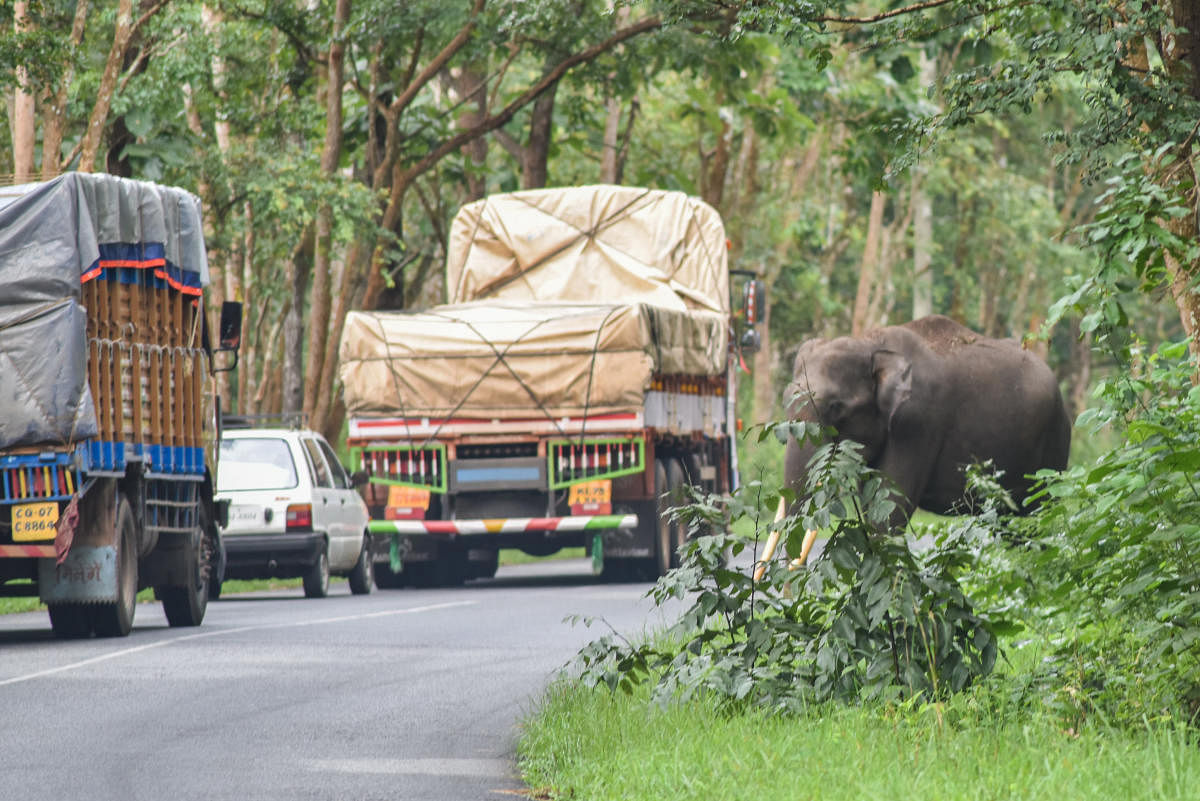
Even as the sky turns magical at the twilight hour, the busy towns of Gundlupet and Terakanambi in the drought-stricken Chamarajanagar district, located adjacent to Bandipur Tiger Reserve, race to wind up trade activities and embrace another peaceful night.
As traders begin to roll down shutters, cargo vehicles transporting essential supplies like vegetables to two mountain districts — Wayanad in Kerala and the Nilgiris in Tamil Nadu — rev up the engines to whiz past the 17-km distance between Gundlupet town and Karnataka Forest Department (KFD) check posts. Even a slight delay would make these vehicles wait till dawn at the check posts, as KFD closes gates at 9 pm, complying with the orders of the Karnataka High Court.
With the gates closed for the rest of the night, the inhabitants of the forest — mammals, birds and reptiles — wake up to life after a day-long lull. The ban on night traffic has virtually provided these animals immunity from being knocked down by the speeding vehicles, for close to a decade.
For years, the two National Highways, NH 181 (linking Karnataka with Tamil Nadu) and NH 766 (linking Karnataka with Kerala), cutting through the tiger reserve had turned into a deathtrap for the wildlife, with more than 40 different species of animals getting killed every year on the road. It was then that the Karnataka High Court, hearing a writ petition in 2009, ordered closure of the NHs for night traffic, thus upholding the animals’ right to live.
However, the ban on night traffic, even though hailed by Tamil Nadu, has not gone well with the neighbouring Kerala, which has based its argument on the reason that its mountain district’s economy, predominantly supported by tourism, has gone for a toss. Even as the case is pending before the Supreme Court, Kerala has systematically failed to convince the judicial bodies, ranging from lower courts to the apex court, that the losses are indeed due to the ban on night traffic.
Karnataka, on the other hand, has been complying with all the orders of the courts, like laying out an alternative road (Hunsur to Kutta), deployment of additional staff and infrastructure development.
DH toured the three states to understand the ground realities and feel the pulse of people. Contrary to the claims of Kerala, a majority of the farmers, traders, merchants and forest officials conveyed their support for the ban. In fact, a few even felt that two-wheelers should be stopped from as early as 6 pm.
Some officials of Kerala’s Transport Department and Forest Department also hailed the ban citing conservational reasons. “The ban has affected the movement of vehicles. But we need to understand that the ban was imposed considering the lives of animals. At least for animals’ sake, we need to continue with the ban,” explained a forester at the Muthanga check post in Wayanad region. Similarly, a transport official at the check post near Muthanga said, “There is an alternative route which people can take.”
What was seen as a conservational issue over the years, is now taking political colours in the region. “Banners were put up and handbills were distributed in the region by various political parties that if they are voted to power, they will revoke the ban. While Karnataka continues to see the issue as purely conservational, Kerala has lent it a political colour,” says Rajkumar, trustee, Wildlife Conservation Foundation, Mysuru.
Working covertly at the bureaucratic and political level to revoke the ban, Kerala recently delivered a shock through Union Ministry of Road Transport and Highways, claiming that both the chief minister and PWD minister of Karnataka have consented to allow traffic day and night through Bandipur, besides consenting to build an elevated road through the forest.
Connecting the mountain districts of both the states, the highways have always been the lifeline for transporting everyday consumables from Mysuru and Chamarajanagar districts. Vegetables, fruits and other consumables to as far as Ernakulam, Kozhikode, Idukki and Wayanad districts are sourced from Gundlupet and Terakanambi, besides Nanjangud and Mysuru markets. As a result, these markets are abuzz with Kerala merchants all through the day.
Traders hail the ban
K M Kumar, a wholesale dealer at Gundlupet APMC market, said, “I am into the trade for the last 32 years. Nearly 95% of vegetables, fruits and other everyday consumables are supplied to Kerala from here. Each day, around 200 truckloads of vegetables and fruits are sent to Kerala via Gundlupet. December to June is the peak season. The ban on night traffic has neither dampened our trade nor have the traders from Kerala upset over the ban. In fact, now there is more discipline among traders and buyers.”
Akbar Ali, owner of NAM Merchants at the APMC, said, “It was all chaos before the ban. Sometimes farmers used to bring their produce late in the night and it was transported in the middle of the night. Night journey along the hilly areas has always been perilous and accidents were common. Sometimes, we used to lose our consignment also. There is no such threat post the ban. All the work gets done by
6 pm and goods are loaded to the trucks that leave the town at 7.30 pm. By 9, vehicles would have passed the check posts. We also can go home early and spend time with the family.” In fact, the ban on night traffic has brought in more prosperity in the region as several entrepreneurs have mushroomed over the years. “Farmers themselves have taken to trading along the highway. Following the ban, there is more discipline and many hiring smaller vehicles to transport goods. Most of these small vehicles pick up goods from roadside markets and leave by evening. Initially, there were some problems, but over the years all of us have adjusted to the ban and timings. In fact, we have been able to have a social time in the evening,” opined Manoj, who has been trading for the last six years.
Crime figures plummet
Contrary to the claims of Kerala, the ban on night traffic has witnessed a huge dip in crime numbers, including the roadkills. Both the police officials and conservation volunteers have carried out independent studies on the crime rate. A senior police officer from Gundlupet Circle revealed that ever since the ban, there has been a 50% dip in the crime rate.
“Previously there used to be cases of truck robbery, poaching, accidents, drunken brawl involving stabbing or murders. But with most of the vehicles leaving the town by evening, there is hardly any scope for crime. Our data for the last 12 years reveal that there has been a considerable decrease in the crime rate,” he said.
According to the data provided by the Circle Inspector of Police, Gundlupet Circle, between 2004 and 2009 there were as many as 55 (non-fatal) and 33 (fatal) roadkills. However, after the ban, from 2010 to 2017, the toll has come down to 29 and 24. Another estimation by the Mysuru-based Wildlife Conservation Foundation revealed that as many as 91 mammals, 75 birds and 56 reptiles were killed on road by speeding vehicles between 2004 and 2007.
